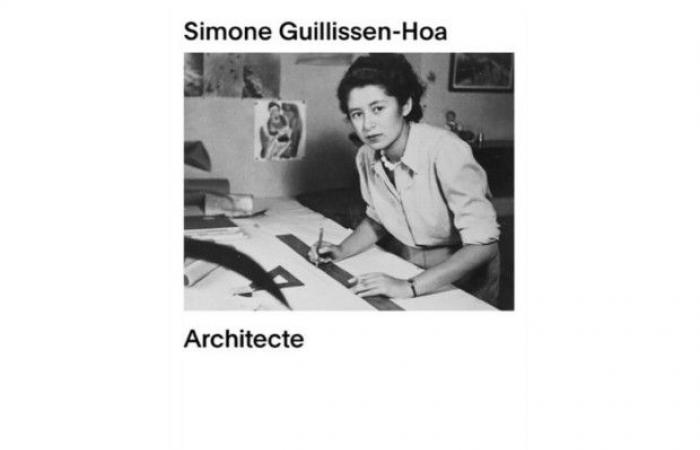A more sustainable and egalitarian architecture. The Academy of Architecture wanted to reward a committed vision during the awarding of the Architecture Book Prize on November 19, 2024. This prize aims to raise public awareness of the quality of architecture.
The thirtieth edition of this award, chaired by Academy member Sylvie Clavel, “highlights works which place architecture at the center of society and which, under the guise of paying homage to architects and their works of yesteryear, address today's issues. An architecture sensitive to its contemporaries is an architecture that will be able to address the challenges of tomorrow“, she says, in a press release.
Who won first prize?
The Architecture Book Prize was awarded this year to Caroline Mierop and Jean-Pierre Hoa for their book “Simone Guillissen-Hoa: architect, 1916-1996” (Prisme Éditions). The biography of aunfairly invisible architect“, writes the Academy in a press release.
This Belgian professional has carried out around fifty projects, from public buildings like the Maison de la culture in Tournai, to villas like the Maison Faniel in Uccle.
“Founder of the second wave of post-war modernism and yet little known, Simone Guillissen-Hoa went through all the ordeals, between China, France and Belgium: resistance fighter, Jewish and deported, single mother… With an extraordinary strength of character from the common, she became an architect and entrepreneur; one of the first women to practice this profession in Belgium. […] Yet she was erased from the history of architecture, for the benefit of Jacques Dupuis who was her associate for only four years.“, continues the Academy.
The jury judged this book “captivating” and welcomed the fact that the authors (Jean-Pierre Hoa is Simone's son) relied on numerous documents and testimonies.
Two mentions
A mention was awarded to architects and doctors in art history Caroline Bauer and Richard Klein, for their work “Innovation Models. The Last Moderns” (Editions du Patrimoine). He “takes up the somewhat forgotten history of the Innovation Models which, from 1972 to 1975, supported by the recently created Construction Plan, and in the wake of the modern movement, attempted to bring together design, innovative construction techniques and industry“, indicates the Academy. The jury judges this text”scholarly and easy to read“, equipped with a “captivating iconography“, which narrates the developments in the design of social housing.
Emmanuel Pernoud, professor emeritus of contemporary art history, also won a mention for “Defensive beauty. Aux Invalides. Specter of the riot and physiognomy of a neighborhood” (editions B2).
The winner offers a “intimate x-ray of a Parisian neighborhood” et “offers us a reflection on the symbolism of the Invalides, this seemingly calm district, which has regularly seen trouble follow one another since July 14, 1789, which began with the invasion of the Invalides, until the Yellow Vests a few years ago. years.”
Youth Prize
The 2024 Youth Architecture Book Prize goes to designer Agnès Hostache for the graphic novel “E. 1027” (Le Lézard Noir edition). It traces the history of the modern Villa E. 1027, designed by Eileen Gray in the 1920s, and which “thus honors its architect: a pioneering woman of the modern movement of the 1930s“, writes the jury.
Jean-Claude Alphen received a mention for “The adventures of Alphonse Lapin” (editions d2eux), which features the intrepid Alphonse Lapin in his adventures and discoveries, and provides a look at different cultures and architectures.
Anne Brouillard also received a mention for “Killiok” (published by L’école des Loisirs), about a character who imagines his new habitat. “This book, without warning, will make children understand the relationships between the use and the conformation of built places. It also introduces all the complexity of design and architectural choices“, believes the jury.
Student Price
The student prize for the architecture book went to Julien Damon, doctor in sociology and teacher at Sciences Po, for “Public toilets, Essay on urban conveniences” (Presses de Sciences Po). “Mocked or ignored, places of comfort condense many societal issues, insecurity and public health at the forefront“, underlines the jury, which considers that the author has approached this universal subject with “simplicity and attention” and which poses urban and societal questions.
Furthermore, a mention was awarded to Justine Lajus-Pueyo, Alexia Menec and Margot Rieublanc for their book “What about vernacular” (Parentheses editions). The authors take the reader to the United States where they completed a three-month study road trip in the East of the country. “Their book reports on their journey and presents twelve themes which bring together traditional and contemporary constructions, all testifying to the constructive and ecological 'common sense' of 'architecture without an architect'.”






